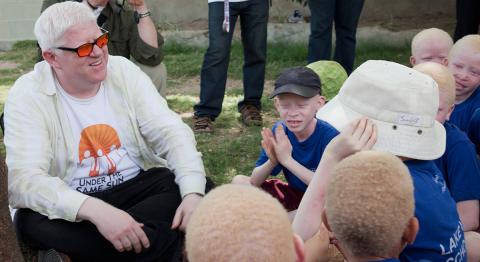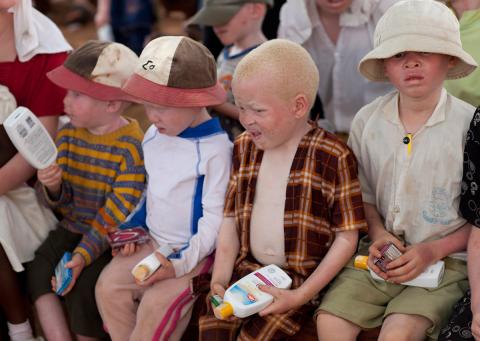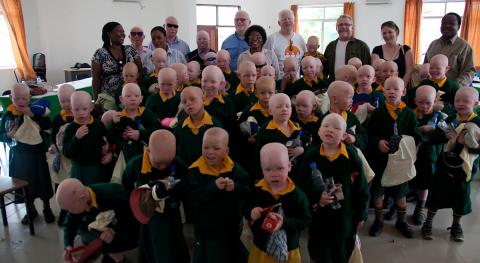
Photo credit: UTTS
It is no exaggeration to say that being born "albino" in the East African nation of Tanzania is one of the unluckiest fates life can hand you. It's also fair to say that Canadian activist and philanthropist Peter Ash has done more to assist Tanzanians with albinism though advocacy, education, funding and sheer resolve than anyone else on the planet.
In most parts of the world, albinism is seen for what it is: a congenital disorder characterized by the absence of pigment in the skin, hair and eyes due to the absence or defect of an enzyme involved in the production of melanin.
People with albinism ("albino" is considered derogatory, Ash says, and is slowly being replaced by this new term) are highly sensitive to sun, classified as legally blind (development of the optical system is highly dependent on the presence of melanin), but are otherwise correctly perceived as ordinary if striking-looking people with white hair and fair skin.
In Tanzania — thought to be the albinism's physiological ground zero where the rate of incidence is 10-times higher than in other countries, occurring in roughly one out of every 2,000 people — people with albinism (PWA) are perceived as inhuman: ghosts or the evil spawn of an African woman and a white man.
Often, a best-case scenario for a Tanzanian with albinism is discrimination or being ostracized, denied an education and treated as a freak. Worst case scenario? Murder or savage mutilation; the guerilla taking of body parts which command a dizzyingly high price (by African standards) on the black market.
Influential witch doctors, who hold powerful sway over the populace, claim that an "albino" arm or leg can be used to create a powerful potion that serves as a gateway to wealth and success. Against this malevolent backdrop, Tanzanians with albinism are sitting ducks for persecution unless they're lucky enough to find themselves in the crosshairs of Vancouver's Peter Ash and his Under the Same Sun (UTSS) charitable foundation, which he founded and serves as CEO.
The mission of UTSS is summed up thusly on its website: "Under the Same Sun is passionately committed to ending the deadly discrimination against albinos in Tanzania. Through education and advocacy we envision a day when the genetic condition of albinism will be understood, and people with albinism will take their rightful place in all aspects of Tanzanian society."
Explains Ash, "In a few cases, we deliberately chose [to use the word] 'albino' only because the public gives us a blank stare when we use 'person with albinism.' They get 'albino' — so we have to start there."
Himself born with albinism, Ash first learned with horror of the harassment and abuse raining down on his Tanzanian brethren in 2008 through a BBC World Service report. Since then, the onetime preacher has dedicated himself to stopping the violence while promoting education.
If the work at times seems insurmountable, the forthright and determined Ash, who spoke to Samaritanmag on the eve of yet another trip to Tanzania (he averages two to three a year) seems like the man for the job.
Samaritanmag: So the BBC brought this issue to your attention?
Peter Ash: Yes. Being albino, I was well aware of the discrimination that was out there, how Hollywood characterizes albinos as evil. What was news to me was the sale of body parts, the human trade in albinism. Through a lot of digging, I managed to track down the BBC correspondent who filed the report, Vicky Ntetema (who now serves as UTSS' executive director in Tanzania where the foundation maintains an office and a staff of about 20, half with albinism). I'd never been to Africa before, but I bought a ticket to Tanzania, went over and just started exploring. I was at a point on my life where I had been very successful and had had a few careers -- including commercial real estate -- so I had more time on my hands and wanted to do something meaningful.

Photo credit: UTTS
Samaritanmag: How did African albinos react to seeing you -- a Caucasian with the same condition?
Peter Ash: They thought I was Swedish or Scandinavian or something, just another white man. They thought albinism only existed in their country.
Samaritanmag: Why is the incidence of albinism so high in Tanzania?
Peter Ash: Every genetic mutation began at a point in time somewhere in the world. An American geneticist who is a specialist in this area theorizes it began about 2,000 years ago in Tanzania or quite near there. If it's true, it's ironic: the genesis of albinism -- the Garden of Eden in you will -- has now become the exact opposite. The gene pool is more concentrated where it began. Remember, in that part of the world, people are living in poverty and they don't move around much. So there is high incidence of inter-marriage and the introduction of new gene pools is limited. So it gets passed on from family to family. But both father and mother have to carry the gene for it to manifest in a child.
Samaritanmag: How did Tanzanian albinos come to be so demonized?
Peter Ash: Depending on the study you read, between 50 and 90 percent of the Tanzanian population believe in witchcraft. And it's been that way forever. It's a part of daily life. Imagine a society without medical data. You have these two black parents with five black children and all of a sudden this other baby pops out that's whiter than most Caucasians. People think it must be a curse from the gods.
People with albinism are considered ghosts, non-human. The family believes they are cursed so the notion of selling that child and maybe even profiting are not so bad. Witch doctors play upon those beliefs, suggesting that a child is evil, and saying that if they can harvest a limb and mix it into a potion and a customer can use that potion to become rich or lucky or whatever, it will make it okay. An albino arm could fetch $3,000 or $4,000 U.S. A complete set of albino organs could fetch $75,000 to $200,000, a fortune where the average median income is $800 a year. If you get $4,000 for an albino arm, that's like five years' wages.
Samaritanmag: Is the Tanzanian government on board with your advocacy and with fighting discrimination against albinos?
Peter Ash: Publicly they are very supportive and they're not standing in our way, but there is much more they could be doing. This is a big story in Tanzania and it's one the government wishes would go away; they have become known as the land of albino killers rather than the land of Mount Kilimanjaro and safaris, which is obviously the image they'd prefer to cultivate. So I am not a popular person and have been told that by high-level government officials. I am seen as tarnishing the image on Tanzania. Rather than blaming the killers, they are shooting the messenger.
Samaritanmag: Just how widespread is this?
Peter Ash: There have been 101 documented crimes against albinos since 2006 -- 78 murders and another 23 attacks, attempted murders or abductions -- and only five of those cases have resulted in convictions. The government could fast-track these cases through the court system, but they haven't. The death penalty is still on the books in Tanzania and the president, Jakaya Kikwete, publicly said in 2009 he would use it against anyone found guilty of murdering an albino. And yet no one found guilty and given the death penalty has been executed. We believe it would be a deterrent to the killings in this country.

Samaritanmag: Those numbers - and that lack of governmental response - are very disturbing in a nation often held up as a model of African progress.
Peter Ash: You have to ask yourself, in a country like Tanzania, who has $4,000 to hand over for an arm or a set of albino body parts? It has to be high-placed and wealthy individuals, the elite and powerful. So what are the odds of those people being exposed? That's why the prosecutions haven't been happening. The only people going to jail are the witch doctors and the killers, not the consumers of the organs, not even in the five cases successfully prosecuted. Even under the threat of death the witch doctors won't reveal [the identity of] their customers. Why? They know to do so would bring death to their entire families.
Samaritanmag: So what's the chief mandate of your foundation, Under the Same Sun?
Peter Ash: Education is our biggest focus and students are our biggest weapon against discrimination. Fast-forward 10 or 15 years; if we have students who are the first in their class, getting jobs and leading in their communities, it will be harder for the country to discriminate against people with albinism. Tanzanian albinos will ultimately win the war for themselves.
Samaritanmag: Where do you gather most of your funding from?
Peter Ash: Our website, www.underthesamesun.com, generates a fair bit especially when there's a media story about this issue. Plus there's word of mouth. We have a fundraising gala in Vancouver every year and we attract some corporate donors. But about 85 percent of the funding comes from me and my family. Hopefully, over the next five years, that ratio will shift to 60/40 coming from the public and coming from us. We want to expand and do more. We have 300 kids in school right now as part of our Education Scholarship Fund program and we'd love to double that number.
Samaritanmag: Do you see a time when UTSS will need to close its doors because this issue will have been resolved?
Peter Ash: Not in my lifetime. This discrimination is deep-seated. It's going to take years. Still, I have a dream that people with albinism will take their rightful place in Tanzanian society. One day.
Air Jordan 1 Mid "What The Multi-Color" For Sale